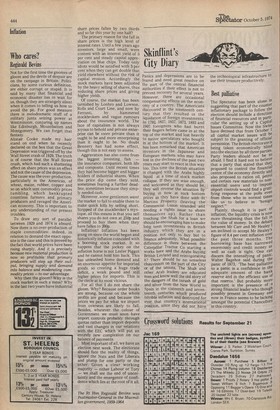Inflation
Who cares?
Reginald Bevins
Not for the first time the gnomes of gloom and the devils of despair are on the rampage in Britain. Politicians, by some curious definition, are either corrupt or stupid. It is said by many that financial and economic disaster lies in wait for us, though they are strangely silent when it comes to telling us how to avoid the pit. For good measure there is melodramatic stuff of a military junta seizing power at Westminster, conjuring up names like Edinburgh, Mountbatten and Montgomery. We can forget that fantasy.
Alistair Cooke made my hair stand on end when he recently declared on the box that the Great Depression was triggered off by the Wall Street crash of 1929. The truth is of course that the Wall Street crash, which had such a shattering effect on share prices was an effect and not the cause of the depression. The cause was the over-production, particularly in the Americas, of wheat, maize, rubber, copper and so on which sent commodity prices tumbling, which bankrupted countless farmers and primary producers and ravaged the American economy. This is important to any understanding of our present troubles.
To draw any sort of parallel between 1929 and 1974 is absurd. Now there is no over-production of staple commodities: indeed, in relation to demand the exact opposite is the case and this is proved by the fact that world prices have been rising sharply. And it is precisely because raw material production is now so profitable that primary producers will step up their output, bringing supply and demand into balance and moderating commodity prices — to our advantage.
Why then the gloom? Why is the stock market in such a mess? Why in the last two years have industrial share prices fallen by two thirds and so far this year by one half?
The primary reason for the fall in share prices is the high level of interest rates. Until a few years ago investors, large and small, were content with an interest yield of 5 per cent and steady capital appreciation on blue chips. Today only idiots would be satisfied with 5 per cent when they can get double that yield elsewhere without the risk of capital erosion. Accordingly the stock markets have been adjusted by the heavy selling of shares, thus reducing share prices and giving higher yields.
Of course, the market has been tarnished by Lonhro and Lowson, Rolls and Court Line, and now by Ferranti, by hammered stockbrokers and vague rumours about the insurance world. The face of capitalism is not always joyous to behold and private enterprise can be more private than it ought to be and more enterprising than it ought to be. No doubt Bennery has had some effect, though this is not easy to assess.
Aggravation has also come from the biggest investing_ fish — the insurance companies, both life and composite. Until recent times they had become bigger and bigger holders of industrial shares. When the price dip came they sold, sometimes fearing a further deadline, sometimes because they simply needed cash.
Moreover, some gentlemen want the market to fall to enable them to make quick kills by selling short. Stripped of the stockbroker's mystique, all this means is that you sell shares you do not own at 250p and proceed to buy them when they have fallen to 200p.
Inflation? Inflation has been going on since the world began and historically inflation coincided with a booming stock market. It so happens that the jockey on the inflation horse is not Lester Piggot ' and he cannot hold him back. This has unleashed home demand and an enormous appetite for imported goods, so creating a huge trade deficit, a weak pound and still higher prices for imports. This is the circle at its most vicious.
For all that I do not share the gloom. Why? Because order books are strong, because on the whole profits are good and because the prices we pay for what we import from overseas are likely to fall. Besides, whatever the colour of Government we must soon have import controls probably through quotas rather than import deposits and vast changes in our relations with the EEC which will put an entirely new complexion on our balance of payments.
Most important of all, we have an election next week. The electorate should face the reality of things, ignore the Nats and the Liberals and plump for one party or the other. Given a clear working majority — either Labour or Tory — we shall see the end of uncertainty and the emergence of confidence which lies at the root of it all.
The Rt Hon Reginald Bevins was Postmaster-General in the Macmillan government, 1959-1964
































 Previous page
Previous page